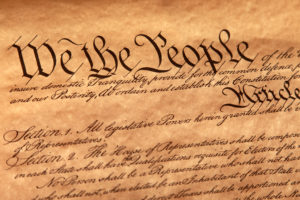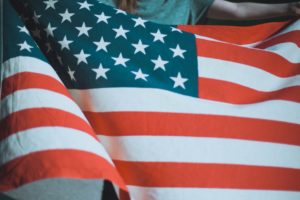The Philosophy, Politics, and Economics of Freedom project empowers teachers to help their students think in new ways about the foundational principles of the United States government.
 Since the Founding Fathers wrote the United States into existence with the Declaration of Independence, the Bill of Rights, and the Constitution, the American education system has grappled with how to instruct its next generation of voting citizens about the philosophical infrastructure behind these foundational texts.
Since the Founding Fathers wrote the United States into existence with the Declaration of Independence, the Bill of Rights, and the Constitution, the American education system has grappled with how to instruct its next generation of voting citizens about the philosophical infrastructure behind these foundational texts.
“Students need to know that government has an important role to play, but that role is specific,” says David Schmidtz, leader of the “Philosophy, Politics, and Economics of Freedom” project at the University of Arizona. “In a free society, metaphorically and literally, choosing destinations for citizens is the sole responsibility of individual citizens themselves. More expansive roles for government tend to invite a tyranny that treats citizens as pawns to be moved around by rulers rather than by hopes and dreams of their own.”
The three-year project is supported by a $2.9 million grant from the John Templeton Foundation and aims to foster research and produce curricular resources that will empower teachers (at the high school and college levels) to help students come to a deeper understanding of the nature of success and the virtues that are required to secure it in our distinctively American context. By 2025, activities funded by the grant will reach some 25,000 high school students — roughly 25 percent of Arizona’s high school student population.
Taking On Conventional Political Wisdom
One of the largest challenges the project aims to tackle is the mechanics of prosperity. John Rawls, a famous political philosopher whose 1971 treatise, A Theory of Justice, redefined the concept of fairness in political philosophy, long championed the idea that justice consists of a certain distribution of resources and opportunity — a position that has largely become political conventional wisdom today.
Through the project, Schmidtz and others at the university aim to show that America works at its finest when policies provide equal protection and opportunity for all citizens, not just when those in political power attempt to manage outcomes or redistribute wealth.
So far, these unorthodox conversations seem to be welcomed by students.
“It’s a great course and I’m proud to teach it. It is college-level material, but it is not merely preparation for a college major. It’s preparation for living a life,” says one teacher, after starting the curriculum in August 2016 at Tucson High Magnet School in Tucson, Ariz.
Bringing the Conversation to the Classroom
 As the school’s Social Studies department chair notes, students today have strong views about politics, but often don’t understand the principles that gave rise to those views. For instance, students may see cronyism as a toxic aspect of capitalism, but they often are not taught the structural and philosophical reasons cronyism emerges in the first place.
As the school’s Social Studies department chair notes, students today have strong views about politics, but often don’t understand the principles that gave rise to those views. For instance, students may see cronyism as a toxic aspect of capitalism, but they often are not taught the structural and philosophical reasons cronyism emerges in the first place.
One student, 18-year-old Kyle, now sees himself starting a business based on the teachings of his philosophy class. Kyle now understands that, ultimately, successful businesses in a free economy are virtuous at their core — meeting people’s needs and doing so through ethical and mutually beneficial practices. In the end, Kyle says, businesses that lack either virtuous purpose or ethical practices won’t — and shouldn’t — succeed.
Another student, Rodrigo, also 18, remarks that one of the key lessons he’s learned is that developing a service that improves people’s lives is one of life’s greatest joys. Initially he wanted to be a doctor, “but now I’m recognizing the impact entrepreneurs have on society. I’d like to be able to do both.”
Kyle and Rodrigo are just two students who are learning to think more critically about American democracy.
Schmidtz is emphatic that the project does not presume a destination, but rather a continuing commitment to vet and interrogate new ideas. While he believes that short-term prospects of a healthy philosophical discussion may appear grim in today’s America, “the long-term prospects remain bright. Wherever innovators have a fire in their bellies to make their world a better place, we will see progress.”